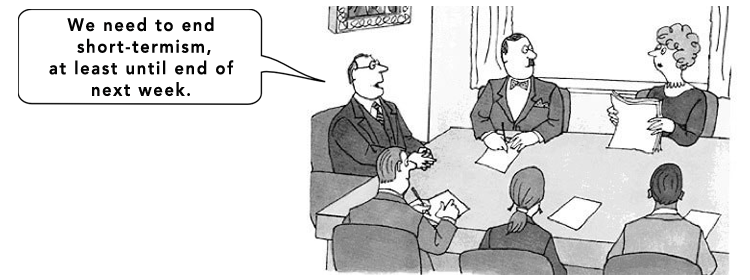
As we enter the new financial year in Australia, we, as business leaders, teams, and shareholders have a choice – we can choose short-termism or sustainable business growth strategies.
If we choose short-termism, we’re compromising any sustainable growth strategy. Short-term performance pressures on leaders and investors can result in an excessive focus on their parts on quarterly earnings, with less attention paid to strategy, fundamentals, and long-term value creation.
Short-termism is not sustainable.
The pandemic, current energy crisis and climate change have exposed the devastating effects of short-termism and lack of sustainable growth strategies like investment in a renewable energy economy. Everyone is now feeling its effects and they don’t like what they see.
Consumers are voting with their virtual wallets. Clients are looking at our supply chains and how we go about sourcing goods and from whom – they are looking for certainty and reassurance that we can supply them. Current energy costs are going through the roof making running a business extremely expensive and possibly inviable if we don’t change what we do. Employee health and wellbeing is still being affected by Covid leading to staff shortages and challenges with delivering regular service. Climate disasters are more frequent leading to displacement of people, loss of jobs and business, and skyrocketing insurance premiums to name a few.
These are just some of the obvious signs we need to transition quickly to sustainable business strategies and models if we want to stay in business.
On the surface, a sustainable business model is what good business leaders set out to do: that the business will be profitable quickly and able to remain profitable in the long term.
However, a sustainable business model is more than rhetoric and a pipe dream. It requires deep thinking, leadership, courage and commitment to solve wicked problems and realise genuine opportunities for growth now and into the future.
A sustainable business model considers economic performance, of course, but it considers equally environmental responsibility and the well-being of people and communities. It needs to be:
- Commercially profitable
- Viable market segments and a sizable customer base
- Compelling value proposition – Why Us
- Satisfies a niche and/or essential service
- Ethical and transparent in its business dealings
- Fairly priced
- Competent and highly effective sales and service teams who add real value to clients and build mutually beneficial relationships that are enduring
- Long term viability
- Ethical sourcing of resources and use of renewable resources
- Supply chain surety without exploitation
- Adaptive to changes in the market and looking to improve how they do business for the better
- Invests in R&D to lead and/or stay ahead of the changes
- Invests in its people and processes to make it easier for everyone to engage and work collaboratively
- Values safety, respect, kindness, and cooperation
- Has a sustainable growth mindset, not a ‘cost cutting’ closed mindset
- It’s human-centred
- Sees its business as serving human needs – customers and community
- Understands why it exists and the part it plays in improving the world, environment, and society
- Adopts a circular economy model or other waste-free models
- Promotes responsible consumption
A business practice that is economically viable, socially responsible, and environmentally friendly is usually regarded as being sustainable. Corporations and businesses that include socially responsible and environmentally sound policies as core elements in their growth strategy very often create sustainable economic value.
It’s clear, the genie is out of the bottle – a sustainable economy is going mainstream despite the desperate attempts of “linear take-make-waste model” that so many modern businesses are built upon.
Make sustainable business strategies your new financial year’s resolution.
Related topics
Sales Strategy: Ditch short-termism for robust sales strategies that drive more & better sales now & over the long-term
The case for long-term focus
Decarbonised systems and strategies
Barrett – participant of the United Nations Global Compact
A year ago
Seven Things to Kick Start Sales Growth in the New FY


New Article Email Notification